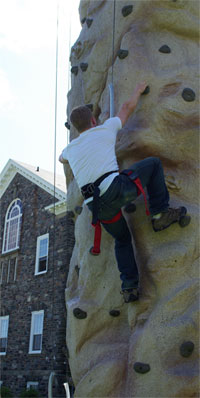 |
| More than 15,000 students are enrolled at ±«Óătv. (Josh Boyter Photo) |
±«Óătv’s overall enrolment is climbing back to the heady levels of the “double cohort” years that followed Ontario’s elimination of Grade 13 and, in 2003, doubled the number of new students heading to college and university from Canada’s largest province.
No such singular phenomenon is behind preliminary enrolment stats. Total enrolment is reported as 15,304, a moving target with early semester comings and goings yet to be sorted out. The number represents an increase of more than 200 students from the same date last year, and is up slightly by 100 from two years ago, the last year of the double cohort bulge.
All of the enrolment growth is at the undergraduate level. ±«Óătv’s 3,500 to 3,600 graduate student class stays fairly constant. The undergraduate enrolment growth is coming almost exclusively from new students, who are direct from high school.
Back to the original question: Where’d everybody come from? Answer: Everywhere.
Dal President Tom Traves likes to call ±«Óătv Canada’s “most national” university. ±«Óătv attracts students from every Canadian province and territory. International students come from more than 100 countries and every part of the globe.
A look at this year’s incoming class—the Class of 2012—reveals about 40 per cent of the new students are from Nova Scotia. Students who call Ontario home make up about 25 per cent of the freshmen class, and new international students are the third largest group. There are 474 new students at ±«Óătv this year from countries other than Canada. Roughly one in 10 new students to ±«Óătv is an international student.
While coffee lines may get a little longer, there’s no need to worry about class sizes. ±«Óătv continues to boast the best faculty student ratio in the country, bar none. There is one prof for every 14 students at ±«Óătv.
The most dramatic change in the student population demographics at Dal, year-over-year continues to be the increase in the percentage of students from outside Nova Scotia and the Maritimes. Just two years ago, just over half of “direct from high school” students were Nova Scotians, and 59 per cent were Maritimers. This year, the Nova Scotian number is closer to 40 per cent and Maritimers make up 51 per cent of frosh.Â
Those changes are not unexpected. The stark reality is an overall population decline in the Maritimes at the lower, or younger end of the spectrum. In order to maintain, and grow its enrolment, ±«Óătv will need to draw an increasingly large number of students from outside the region and the country.
